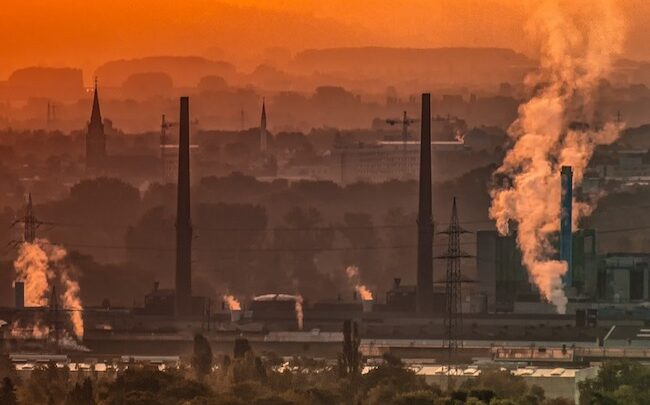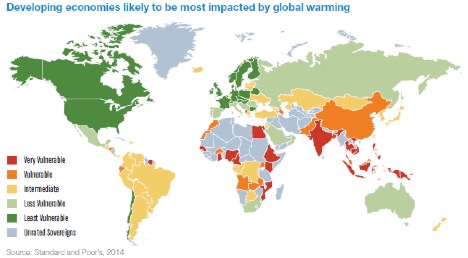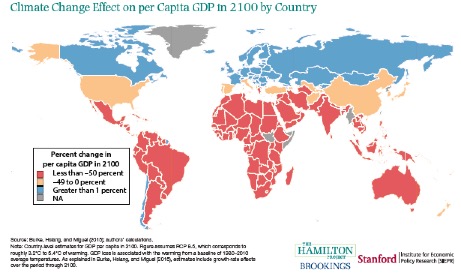The economic impact of climate change
Climate change is having an economic effect on the earth that many policymakers and economists are concerned will have long-term ramifications. The effects will impact key aspects of the globe’s economy that will be irreparable.

Despite the disagreement from certain critics and skeptics, climate change is having an effect on the planet. From ravaging forest fires to droughts to changes in seasons, climate change is impacting the way we live and our seasonal routines. Climate change has made blizzards occur more frequently and severe while heat waves are getting worse and hurricanes are having dangerous consequences for the southeastern part of the United States as well as its east seaboard. The problem is not just the loss of life associated with extreme weather events, but also the damage and loss of homes, buildings, crops, and forests. The investment firm, Morgan Stanley, estimates that the cost of climate disasters in North America came to $415 billion in the time period of 2015 to 2018 mainly because of wildfires and hurricanes. When the state of Texas was hit by Hurricane Harvey in 2017, it was estimated that it incurred losses of $125 billion. On a global scale, the situation could have more dire consequences as researchers theorize that an increase in the average global temperature by 0.04 degrees Celsius annually could reduce the world’s real GDP on a per capita basis by 7.22 percent by the year 2100. While there are other aspects of global warming and climate change to consider, the bottom line is that the economic and financial results will be devastating for many countries.
Impact on industries
The economic and financial impact of climate change on industry can be substantial in many different ways. One way that climate change can reduce industrial output is with the increase in storms and hurricanes, there is disruption in lost work time, school days, transportation of goods and products, energy production, and tourism. With the increase of extreme weather conditions, such as massive blizzards in certain parts of Western Europe and North America, there will be more power outages, traffic delays, cancellation of commercial and cargo air flights, and the shutting down of cities and towns. There is also the loss of productivity in cases when extreme heat situations either curtails or halts construction projects or when there is a greater chance of the transmission of allergies and that an increase in air pollution ultimately leads to a higher loss in work and school days.
Another way that industry will be affected is that with the increase in hurricanes and the resulting damage to homes, cars, buildings, businesses, and personal property there will ultimately be higher insurance costs. The insurance industry will see more claims from policy owners because of the increased number of natural disasters due to climate change and the resulting extreme weather conditions. For example, the year 2011was a very expensive year for insurance claims in which insured losses cost the industry in excess of $126 billion. Increasing insurance claims will cause insurance companies in the future to either raise premiums on policy owners or cancel policies in high-risk areas and categories altogether. This will make it extremely difficult for property owners to get or keep coverage and therefore purchase homes or expand their businesses in the future. Governor Mark Carney of the Bank of England stated that based on the research conducted by the Bank recently, climate change is considered a major risk that the insurance industry faces. From 2016 to 2018, the average annual financial loss in the United States from natural disasters totaled approximately $150 billion while for the period of 1980 to 2019 the total average annual losses were less than $50 billion.
Industry faces another key problem due to climate change and extreme weather in that industrial output will decrease and the prices of goods, products, and services will rise substantially over time. Inflation will more than likely rise due to the shortage of goods and products because of hurricanes, tornadoes, and extreme weather destroying manufacturing facilities in various parts of the world. This will cause disruption in supply chain management globally and that prices will be pushed up due to supply and demand economic principles being invoked. Industries will face shortages and this will ultimately be passed on to end users, the global consumer. Prices will go up and the consumer must make the decision to either pay more for goods or forgo altogether. If this means giving up food and medicine, then consumers will be placed in a very difficult position until normal production and distribution channels resume. Until then, higher prices and shortage of goods and products will be the norm for a time to come.
An aspect of industry that would suffer serious financial harm due to climate change would be infrastructure. The problem is that infrastructure would experience harm due to the risk from flooding. With climate change there is the risk of the sea level rising causing roads, bridges, highways, railroads, and subways to be flooded in cities located on a coast such as New York City. In 2012, Hurricane Sandy caused $65 billion in damage in the United States and severe flooding in New York City in its streets, tunnels, and subway lines. In New Jersey, the subway line that connects Hoboken and Manhattan and runs under the Hudson River was flooded and out of service for a substantial time period. The tunnel had to be repaired which cost a sizable amount of money and the train station in Hoboken had to be redone.
In addition to the damage to highways and subways due to climate change, communication systems could face serious ruin. In 2018, a study showed that over 4,000 miles of fiber optic cable including data centers, traffic exchanges, and termination points which are vital to the global information network will suffer serious damage due to rising sea levels. According to the National Oceanic and Atmospheric Administration (NOAA), their projections for the rising sea level states that the communications infrastructure for the United States could be underwater by the year 2033 since it is buried alongside coastlines and highways. Cities such as New York, Miami, Seattle, and Boston will have problems with their communications network in case there is another Hurricane Sandy sometime in the future. But industry is only one aspect of how climate change can have economic and financial impact.
Impact on agriculture
Climate change has a huge impact on agriculture because it is dependent on the weather in order to be productive. If there is one thing everyone on this planet must do to survive, it is to eat. Many people do not eat every day, but the majority who do will see drastic changes in the amount of food available, the type of agricultural products there are, and the cost. In the United States the effects of climate change are evident in crops such as corn and soybean in which their yields have dropped when temperatures go above 84 degrees Fahrenheit. Corn and soybean are used as animal feed and for diverse products. When there is less corn and soybeans being grown, then the price will rise, ultimately causing a spike in food prices.
Markets for certain crops will shrink, such as corn and soybeans, but then farmers must switch to other crops that can quickly adapt to climate change. For example, farmers will probably grow more grain since it can adapt readily to rising temperatures. But this will hurt farmers financially because if more grain is cultivated, then there will be an oversupply with minimal demand and then prices will drop. This could cause farmers to actually take a loss for the extra grain they grow. With grain prices dropping, it will not be worth the farmer’s time to grow any more. There are also the problems that certain crops will not adapt to climate change and will either die off due to drought or are not grown by farmers. Certain crop will become more expensive to grow since they will need more water and fertilizer due to higher temperatures. This will mean that the higher cost for growing certain crops will be passed on to consumers, thus causing food prices to rise substantially.
But agriculture products are not the only items affected by climate change. The fishing industry has been affected due to warming oceans. A study produced in 2019 has shown that a warming ocean has reduced sustainable fish yields by 4 percent since 1930 which comes to 1.4 million metric tons. In places such as the Sea of Japan and the North Sea, there has been a 35 percent decline in sustainable fish yields since 1930. Among the fish affected are haddock, herring, and Atlantic cod. The problem that come from this situation is that there are billions of people who need fish as the key source of protein in their diets. There is also the damage to the fishing industry which has seen fleets get smaller, fewer people employed, and the value of the industry shrink dangerously. Fish can provide a healthy alternative to red meat, but if the oceans are warming up, then this will result in fewer fish being harvested from the seas around the world.
Certain parts of the United States are heavily dependent upon agriculture as part of their economy. States in the Midwest such as Kansas, North and South Dakota, Nebraska, and Iowa are known for such crops as corn, soybeans, and wheat, to name a few. If there are extreme weather events such as killing droughts and heavy rain, these crops and the states they are grown in will suffer immensely. The Midwest has seen rainfall increase 37 percent since the 1950s while in 2019 it has experienced above normal rain amounts along with melting snow that is responsible for historic flooding. The increase in flooding have caused fields to erode and the loss of livestock by drowning. States such as Nebraska have lost $440 billion in cattle while Iowa has incurred losses of $1.6 billion. In sum, climate change will hurt farmers but also consumers through higher food prices.
Impact on GDP
Gross domestic Product (GDP) will see a shift due to the rise of climate change. It has been estimated in a report from The Hamilton Project and the Stanford Institute for Economic Policy Research that if the global temperature were as high as 4 degrees Celsius then the annual decease in GDP would be approximately 2 percent. This drop in GDP will affect employment patterns, total jobs globally, economic growth, as well as industrial output and agricultural production. Looking at the impact on GDP per capita, the same report cites that there could be reductions of between 1.0 and 2.8 percent annually. This could cost the global economy trillions of dollars every year in losses and sink more people into poverty.
Also, on a global basis it has been found that there is a positive relationship between current GDP and global warming in which there is a lower per capita GDP that is generally associated with higher temperatures. In a paper published in 2019, Noah Diffenbaugh and Marshall Burke have summarized that “at a given level of wealth, warmer countries have tended to experience more negative impacts, while cooler countries have tended to experience fewer negative impacts. Because the majority of the world’s warmest countries are poor, the majority of large negative impacts have been concentrated in poor countries.” The opposite can be said of the globe’s wealthiest nations that are in temperate or cooler weather in which they have seen higher GDP figures.
In the long run, it has been cited in a paper by University of Southern California economist Hashem Pesaran that global GDP per capita could see a decrease of 7 percent by the year 2100 if no action is taken to reduce the effects of climate change. This could lead to not only a slowing global economy, but also a permanent decrease in economic growth in which the poor will only get poorer and the new normal will be reduced living standards for all.
Climate change will have a deep impact
The problem of climate change is real and dangerous. It will have serious impact on our daily lives in many ways but especially from an economic and financial perspective. Climate change will affect not only what types of jobs people will have but if they will have one at all. It will also mean if people can eat on a regular basis and whether they can afford to eat. There must be action taken on dealing and combating climate change before it is too late and hampers economic development and growth.






